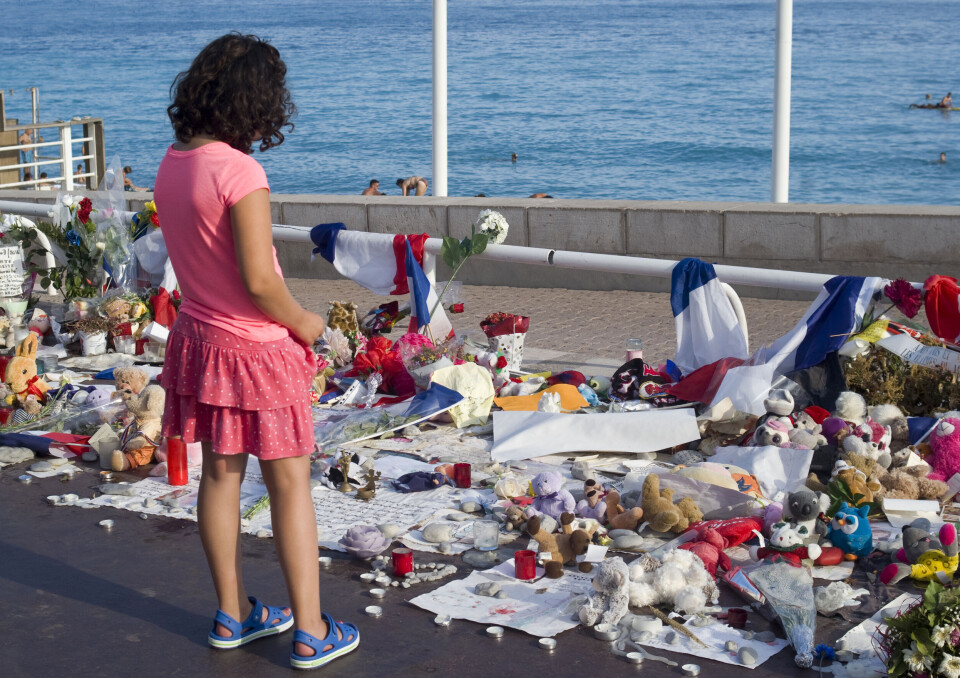-
Mysterious boom rattles residents in south-west France
Local community turns to social media for answers
-
France tightens reimbursement rules for flight delays or cancellations
New measures include mandatory mediation and new claim procedures
-
What snow conditions look like for skiers across French Alps and Pyrenees
Ski resorts are expected to get busier as school holidays begin this weekend
Trauma remains for children of July 14 terror attack in Nice
As the trial continues over the terrorist attack in Nice, France, on July 14, 2016, psychologists are helping children to overcome their trauma

The trial of eight suspects accused of links to the terror attack in Nice on July 14, 2016, has begun, highlighting the difficult work of preparing child victims to testify and live with their post-traumatic stress.
The July 14 attack was unique in France for the number of minors affected, who continue to suffer post-traumatic stress.
Eighty-six people, including 15 children and teenagers, were killed as Mohamed Lahouaiej-Bouhlel drove a lorry through crowds gathered on the seafront to watch fireworks on France’s national day. Hundreds more children were injured, physically and psychologically.
Among those receiving help are children who were not born at the time of the attack but whose families were affected.
Delphine Courtonne, deputy director of Montjoye association, which is preparing victims for the trial with social, legal and psychological support, said: “Parents have told us the trial has revived, or worsened, elements which were already there.”
Since 2016, Montjoye has supported 4,000 victims, including 500 minors at the time of the attack who were either injured, knew somebody who was killed or injured, or experienced psychological trauma.
“There are children who want to avoid the topic, while others might have trouble sleeping,” Ms Courtonne said. Others are now living “a reasonably ordinary life for kids of their age”.
62% suffered from PTSD
The Lenval foundation, which runs a children’s hospital in Nice, was seeing so many patients suffering post-traumatic stress that it created a service dedicated to child and adolescent psychological trauma.
Florence Askenazy, head of child and adolescent psychiatry at Nice CHU-Lenval, said: “We continue to receive new requests for appointments linked to the attack – fear, trouble concentrating, separation anxiety. Those requests have been increasing since May as the trial approached.” By the end of July, the centre had seen almost 700 patients for 7,889 consultations in relation to the attack, or the stabbing at Notre-Dame church in Nice on October 29, 2020.
Read more: Eight to stand trial six years after Bastille Day attack in Nice
The foundation is also participating in a study of children exposed to the Nice attack, called ‘14-7’. There are 692 participants, including 289 parents, and children of all ages. The youngest victims will be monitored until they turn 25.
62% of minors who were present at the time of the attack, and who visited the centre for consultations, were suffering from post-traumatic stress when they arrived, Professor Askenazy said.
According to the Lenval foundation: “Studies suggest a third of victims will have suffered long-term consequences, most likely until adulthood.”
The psychiatric team will measure children’s concentration, memory, and sleeping patterns before and after the trial to see if symptoms reappear.
Children to testify
A number of minors are due to testify during the trial, which is being held in Paris. There will be a dedicated room at the courthouse in Nice where they can testify via videolink.
Montjoye has been working with children to help them understand the trial.
It created an immersive platform for adolescents which is a 3D reproduction of the courtroom in Paris, allowing them to use an avatar to sit in any section – with the civil plaintiffs, in the dock, in the witness box – to remove some of the mystery and stress.
Children usually have many questions, whether they were at the scene or not.
Ms Courtonne said: “They ask why there is a trial six years after. We explain the different roles, the investigation, the need to gather all the evidence.
“They also clearly wonder how we can have a trial when the main suspect – the driver of the lorry – is dead.”
Lahouaiej-Bouhlel was shot dead by police at the scene.
The eight suspects standing trial are accused of having links with him or being implicated in arms trafficking which allowed him to obtain a pistol.
Helping young victims to understand the events of July 14 is a different matter.
“Lots of children only understood later that it had been deliberate,” Ms Courtonne said. “The trauma is different when there is an intention from one human being towards other human beings. It’s more difficult for children to understand. There is no logic to it – even as adults, we have no answer.”
Montjoye often works with entire families to help them process the events.
“It’s difficult to be a parent and a victim at the same time. Parents must help their children to get through this, when they are victims themselves and it’s already difficult to keep from falling down.”
The children of people killed or injured in terrorist attacks can be 'adopted' by the state as 'Wards of the Nation', and receive moral and material support. This is also open to foreign children impacted by terror attacks in France (read more here).
Related articles
November 13 Paris attacks trial: Life sentence but not for 130 deaths
Career change in France: Paris attack made me reflect on what I wanted
























